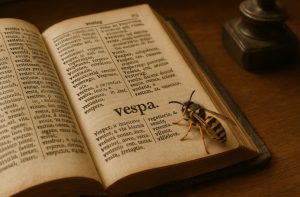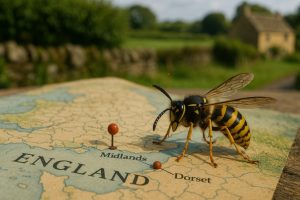Have you ever heard someone refer to a wasp as a “jasper” and wondered what it meant? If you’re from or have spent time in the Midlands or parts of Dorset, the term might sound familiar.
But for many others, it’s a curious nickname that seems unrelated at first glance. So, where does this unusual name come from, and what does it reveal about English language and culture?
Could the Term “Jasper” Come from the Latin Word for Wasp?

One possible explanation lies in the evolution of language over centuries. The Latin word for wasp is vespa, a term that has clear phonetic similarities to “jasper.”
While the two words may not appear directly related at first, regional dialects in England have a long history of transforming Latin roots into more locally pronounced versions.
It’s entirely plausible that, through gradual shifts in speech and spelling, “vespa” could have become “jasper” in some communities.
Language, particularly in spoken form, often adapts over time and can be shaped by local accents, mishearings, or even slang tendencies.
In regions where Latin influence on vocabulary lingered especially through ecclesiastical or legal language, it’s not uncommon to find modern words that have morphed significantly from their original form.
If this theory holds, “jasper” may represent an old linguistic thread carried forward in certain pockets of England.
Does the Wasp’s Appearance Resemble the Jasper Mineral?
Another explanation takes a more visual approach. The mineral jasper is known for its distinctive bands, layers, and patterns of colour usually featuring earthy tones interspersed with streaks of red, yellow, or brown.
Wasps, especially the common yellowjacket, are marked by high-contrast stripes of black and yellow on their abdomen. It’s this banded appearance that might have led people to liken the insect to the mineral.
This theory treats the nickname as a metaphor, where the striking visual pattern of the wasp reminded people of the streaked surfaces of polished jasper stones.
The name could have emerged as a kind of folk comparison, especially in rural areas where both wasps and decorative stones were part of everyday life.
Unlike the linguistic route from Latin, this interpretation relies more on visual association than phonetic similarity.
Where in England Is the Term “Jasper” Commonly Used?

The nickname “jasper” for a wasp is not universally recognised across the UK. Instead, it is heard primarily in specific regions most notably in parts of the Midlands and Dorset.
These areas have preserved many unique and colourful expressions that do not always travel far beyond county lines.
The English language is filled with regionalisms terms and phrases that are passed down through generations within certain areas. These words can fade from use in other places but remain vibrant in local conversation.
In this case, “jasper” has endured as a piece of living dialect in a few English communities, even though most people across the UK would simply use the word “wasp.”
Local slang often persists thanks to community traditions, oral storytelling, and rural isolation.
Unlike official or scientific names, these expressions are rarely documented in dictionaries but hold cultural significance within their regions.
Does “Jasper” Have Any Other Meanings in English?
Yes, but these meanings are unrelated to the insect world. In older English slang, particularly in the 19th and early 20th centuries, “jasper” was used as a casual term for a man or fellow, similar to saying “chap” or “bloke.”
While not as common today, this meaning can still be found in old literature or oral tradition.
It’s important to distinguish this usage from the insect-related nickname. The context makes the difference. In one setting, a “jasper” might buzz around your picnic, while in another, a “jasper” might be a stranger you bump into on the street.
The fact that the same word can carry such different meanings is a testament to the richness and flexibility of English dialects.
What Do These Theories Suggest About Language and Culture?
Both main theories whether based on Latin roots or visual resemblance highlight the deep connection between language and local culture.
The evolution of a word like “jasper” shows how names can arise from practical observation, creative thinking, or linguistic drift. It also reminds us that language is not static.
Words change, meanings shift, and expressions become embedded in the unique fabric of a region’s identity.
Summary Table: Theories Behind the Nickname “Jasper” for Wasps
| Theory | Description |
| Latin Derivation | Possibly evolved from the Latin word vespa through regional dialects |
| Visual Similarity | Resembles the striped, banded appearance of the jasper mineral |
| Regional Use | Most common in parts of the Midlands and Dorset |
| Other Usage | Also an older slang term for a man, though unrelated to wasps |
The term “jasper” as a nickname for wasps might not be widely known, but it’s a fascinating example of how language blends observation, tradition, and regional identity.
Whether rooted in Latin or inspired by colour and pattern, it’s a reminder that even the simplest words often have deeper stories behind them.
FAQ
What does “jasper” mean in this context?
In some regions of England, “jasper” is a local nickname for a wasp.
Where in the UK is the term “jasper” commonly used?
It’s mainly heard in parts of the Midlands and Dorset.
Is the term “jasper” used officially for wasps?
No, it’s an informal, regional slang term, not a scientific or official name.
Could the word “jasper” come from Latin?
Yes, it may have evolved from the Latin word vespa, meaning wasp.
Does “jasper” refer to the insect’s appearance?
Possibly, wasps’ striped abdomens resemble the banded jasper stone.
Is “jasper” used in other ways in English?
Yes, it can also mean a man or fellow in older English slang, though that’s unrelated.
Why do regional dialects have different names for the same thing?
Dialects evolve locally, often shaped by history, culture, and oral tradition.






